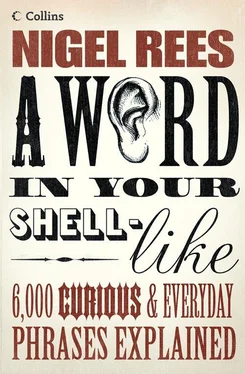Stock phrase : a regularly used phrase that can’t be said to have ‘caught on’ like a full-blooded catchphrase – for example, a celebrity’s verbal mannerism (CAN WE TALK?), by which he or she is known but which can’t be said to have ‘caught on’ with the public as a proper catchphrase should. It also refers to phrases which get regularly trotted out but which, again, cannot be said to have passed into the language generally.
A word about dating: Eric Partridge was always ‘game’ (as someone once felicitously put it) to try to pinpoint when a phrase came into use, though many of his stabs at it were no more than guesses. Using the citations that I have accumulated, I have tried to be a little more precise in this area. When I say that a phrase was ‘ Current in 1975’, I mean that I simply have a record of its use then – not that I think it was first used in that year. It may also have been current long after that date. When I say that a phrase was ‘ Quoted in 1981’, I mean precisely that – not that it was originated in that year. It might have been coined long before. On the whole I have not indulged in speculation about when a phrase might have entered the language but have simply recorded hard and fast examples of its use.
In case you find my interpretation of alphabetical order puzzling, the phrases are listed in what is known as ‘letter by letter’ order – that is to say, in alphabetical order of letters within the whole phrase exactly as it is written. Thus, for example, nicest things come in smallest parcelsappears before nice work if you can get it!and move the goalpostsbefore Mr.
Cross-references to other entries are made in SMALL CAPITALS.
Apperson: G. L. Apperson, English Proverbs and Proverbial Phrases , 1929
Bartlett : Bartlett’s Familiar Quotations (15th edn), 1980, (16th edn), 1992, (17th edn), 2002
Benham : Benham’s Book of Quotations , 1907, 1948, 1960
Bible: The Authorized Version, 1611 (except where stated otherwise)
Brewer : Brewer’s Dictionary of Phrase and Fable , (2nd edn), 1894, (3rd edn), 1923, (13th edn), 1975, (14th edn), 1989
Burnam : Tom Burnam, The Dictionary of Misinformation , 1975; More Misinformation , 1980
Casson/Grenfell : Sir Hugh Casson & Joyce Grenfell, Nanny Says (ed. Diana, Lady Avebury), 1982
CODP : The Concise Oxford Dictionary of Proverbs , 1982
DOAS : Wentworth & Flexner, Dictionary of American Slang , 1960 (1975 revision and 1987 edition, ed. Robert L. Chapman)
DNB : The Dictionary of National Biography
Flexner : Stuart Berg Flexner, I Hear America Talking , 1976; Listening to America , 1982
Grose : Francis Grose, Dictionary of the Vulgar Tongue , 1785–1823
Mencken : H. L. Mencken’s Dictionary of Quotations , 1942
Morris : William and Mary Morris, Morris Dictionary of Word and Phrase Origins , 1977
ODP : The Oxford Dictionary of Proverbs (3rd edn), 1970
ODQ : The Oxford Dictionary of Quotations (2nd edn), 1953, (3rd edn), 1979, (4th edn), 1992, (5th edn), 1999
OED2 : The Oxford English Dictionary (2nd ed,) 1989, (CD-ROM version 3.0), 2002
Partridge/Catch Phrases : Eric Partridge, A Dictionary of Catch Phrases (2nd edn, edited by Paul Beale), 1985
Partridge/Slang : Eric Partridge, A Dictionary of Slang and Unconventional English (8th edn, edited by Paul Beale), 1984
Safire : William Safire, Safire’s Political Dictionary , 1978
Shakespeare: The Arden Shakespeare (2nd series)
Slanguage : Brigid McConville & John Shearlaw, The Slanguage of Sex , 1984
Street Talk : Street Talk: The Language of Coronation Street , eds Jeffrey Miller & Graham Nown, 1986
abandon hope all ye who enter here!Ironic but good-humoured welcoming phrase – a popular mistranslation of the words written over the entrance to Hell in Dante’s Divina Commedia ( circa 1320). ‘All hope abandon, ye who enter here!’ would be a more accurate translation of the Italian, ‘ lasciate ogni speranza voi ch’entrate !’
—abhors a vacuumPHRASES A format based on the maxim ‘Nature abhors a vacuum’ that François Rabelais quotes in its original Latin form, ‘natura abhorret vacuum’, in his Gargantua (1535). Galileo (1564–1642) asserted that it was the reason mercury rises in a barometer. An early appearance in English is, ‘The Effatum, That Nature abhors a Vacuum’, from Robert Boyle, A Free Enquiry Into the Vulgarly Receiv’d Notion of Nature (1685). ‘Nature abhors a straight line’ was a saying of the English garden landscaper Capability Brown (1715–83). Clare Boothe Luce, the American writer and socialite (1903– 87), is supposed to have said, ‘Nature abhors a virgin’, but this may just be a version of the line in her play The Women (1936): ‘I’m what nature abhors – an old maid. A frozen asset.’ ‘Nature abhors a vacuum and what appears ultimately to concern the Reagan Administration most of all is the possibility that President Mitterrand’s France will gradually abandon its traditional military protection of central Africa and the Sahara’ – Financial Times (12 August 1983); ‘I quickly developed a pear-shaped figure that testified to my indolent lifestyle. I became the archetypal also-ran that PE masters could barely bring themselves to talk to without risk of life-threatening apoplexy: they abhorred my idleness as Nature abhors a vacuum’ – The Guardian (24 June 1986).
abide with meSee CHANGE AND DECAY.
above and beyond (the call of duty)Phrase expressing an outstanding level of service, used in tributes and such like. OED2 has several ‘above and beyonds’ but not this precise one. Above and Beyond was the title of an American TV series of military stories ( circa 1996).
Abraham’s bosomWhere the dead sleep contentedly. From Luke 16:23: ‘And it came to pass, that the beggar died, and was carried by the angels into Abraham’s bosom.’ The phrase alludes to Abraham, first of the Hebrew patriarchs. Compare ARTHUR’S BOSOM.
absit omenSee GESUNDHEIT.
absolutely, Mister Gallagher! / positively, Mister Shean!Phrases of agreement; roundabout ways of saying ‘yes’, taken from the American vaudevillians (Ed) Gallagher and (Al) Shean whose act flourished in the early part of the 20th century. The exchange was included in a popular song ‘Mr Gallagher and Mister Shean’ (1922) though, in that song, the order of words was ‘positively, Mister Gallagher / absolutely, Mr Shean’. Each syllable of the adverbs is emphasized – e.g. ‘pos-it-ive-ly’, ‘ab-so-lute-ly’.
accidents will occur in the best-regulated familiesA catchphrase used lightly to cover any domestic upset. The basic proverbial expression, ‘Accidents will happen’ was known by the 1760s; this full version by the 1810s. Best known in the form delivered by Mr Micawber in Charles Dickens, David Copperfield , Chap. 28 (1850): ‘“Copperfield,” said Mr. Micawber, “accidents will occur in the best-regulated families; and in families not regulated by…the influence of Woman, in the lofty character of Wife, they may be expected with confidence, and must be borne with philosophy”.’ Dickens had earlier used the saying in Pickwick Papers (1836–7) and Dombey and Son (1844–6).
Читать дальше












